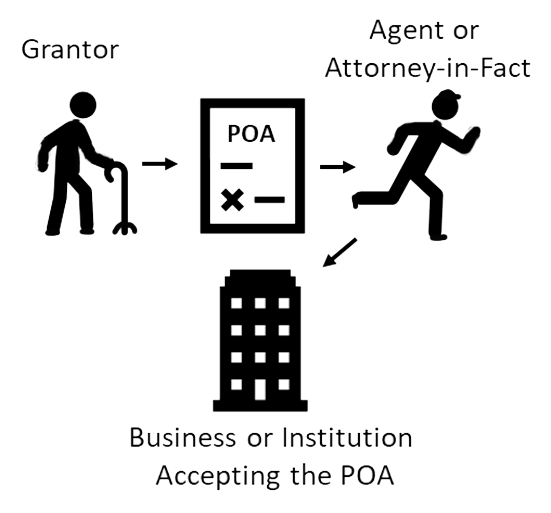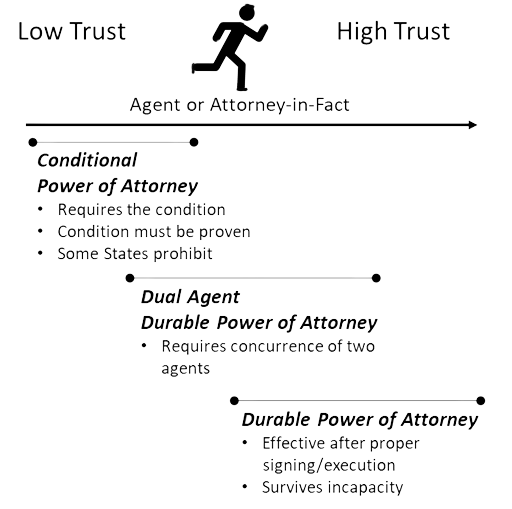Quick Tip
When we become incapacitated, the power to act on our behalf is created using a document known as a Power of Attorney
A Power of Attorney (POA) is a document where one person grants another the power to act on their behalf. The person giving the power is called a grantor, principal or donor (of the power). The person receiving the power is called the agent or attorney-in-fact.

This concept is very old. Think of how a merchant (or farmer) would do business if they could not be present at a transaction? Who could represent the merchant? What could this representative do? Would the representative’s actions be considered the will of the merchant? These circumstances describe how the law of agency emerged: the origins of POAs.
The reason most Seniors require POAs is to address medical and financial issues. Typical situations include:
In the senior scenarios presented above, the Grantor becomes cognitively diminished or put in a complicated family situation. An Agent who acts exactly as the Senior (Grantor) would act is the ideal solution. But that’s a complicated business.
The good news is that the Agent has a “fiduciary duty” to the Grantor. This duty includes many responsibilities including absolute loyalty (no self-dealing); accounting of the state of assets and/or accounts; protecting, persevering and maintaining assets; disclosure of material facts to people who have a lawful interest in these facts; confidentiality; properly invest; and to file taxes if required.
The bad news is that enforcement or supervision is often difficult and time-consuming. In short, if a bad person is your Agent they can do lots of bad things. Also keep in mind that even good people, when faced with challenges or problems, may do bad things. Your agent when pressured may do something that you would never do. For example, a drug-addicted grandchild claims to need $1,000 a medical procedure. Why would you say no? Do you know all that the Grantor knows? Of course not. Do you want to hurt the Grantor’s grandchild’s life? Of course not.
A Power of Attorney can be used in many ways, for many purposes. They can be general (very broad), limited (aka special) or temporary. General POAs cover personal and business issues. Limited POAs address specific tasks or acts. For example, selling a car. Temporary POAs are valid during limited time frames like when the Grantor becomes incapacitated.
Dual Agents
There does not have to be one Agent. Some people may want two Agents to agree before actions can be taken on their behalf. Carmen and I have seen cases, where multiple children actually request that they all be listed as Agents on their parents POAs so that they can agree before making decisions on their parent’s behalf. This strategy can be complicated, confusing and time consuming for many reasons and is not generally recommended. However, Carmen and I have heard of and been involved in cases where Grantor does not trust a single person to make their decisions or situations where children collectively request to be required to act together on their parent’s behalf.
TIP: Perhaps the most challenging aspect of a POA is ensuring that they can be enforced when presented to the Business or Institution that is being asked to take an action.
Durable Power of Attorney Versus or Springing Power of Attorney
A Durables Powers of Attorney (DPOA) is a lifetime contract. Let’s examine “lifetime” for a moment. During one’s life, there are many possible scenarios where the Grantor may be incapacitated (e.g., while being operated, while on life sustaining medical support, etc.) or cognitively impaired (recovering from an illness, diagnosed with dementia, etc.). A DPOA is designed to stay in effect during these situations, and allow the Agent to act on the Grantor’s behalf. “Lifetime” also implies “life” and a DPOA ceases at death. A DPOA is a life only contact.
A Springing Powers of Attorneys (also called a Conditional Power of Attorney) go into effect only after a certain condition is met like travelling abroad for military service or becoming incapacitated. At first glance, a Springing POA may seem like the logical choice for a senior feeling healthy and competent. But a Springing POA by definition requires a “conditional” event to occur. Some conditional events may be easy to identify. Military deployment is an example of an easy to verify conditional event. But others, like incapacity may be more challenging. Another challenge of Springing Powers of Attorneys is that some States have (or may) make them illegal or difficult to enforce.
Cognitive impairment versus Mental Incapacity
Cognitive impairment in a person is when they have trouble concentrating, remembering, learning new things or making basic every day decisions. Cognitive impairment is scaled around the impairment in making every day decisions. But cognitive impairment is not a legal term. Legal incompetence, referred to as Mentally Incompetent is a probate court proceeding where a petition must be filed, a psychological examination must be given and an appropriate guardian appointed. The process can be challenged by the patient. It takes time and resources to declare someone mentally incompetent.
Proper Execution of A Power of Attorney
A Durable Power of Attorney goes into effect as soon as it is properly executed. Properly executing a Power of Attorney is governed by State Law. State law dictates how a Power of a POA must be executed.
All States require some combination of the following:
- Signed and dated by the Grantor
- Notarized
- Witnessed by two parties over 18 (generally by disinterested parties who do not stand to benefit from POA)
- For real estate transactions:
- Special language is often required and
- POA must be recorded in the office of the Recorder of Deeds
Most attorney’s will tell you that if you do all the above, properly worded in the POA, every State will accept the POA. There can be other defects in a POA, but in terms of execution, doing more will almost always work to your advantage of its done properly. Most States are members of the Uniform Power of Attorney Act which is designed to help clarify issues around what constitutes a properly drafted POA, obligations of third parties to accept POAs and State requirements to accept POA’s executed in other States.
When Does a Power of Attorney Go into Effect
A POA is essentially a contract. A Durable POA goes into effect as soon as it is properly executed. It requires no conditions to be met. A Springing POA (aka Conditional POA) requires the “condition” to be met. However, often that condition may be difficult to determine.
How To Use A Power Of Attorney
To use the POA, the Agent (aka attorney-in-fact) presents the POA to the business, person or entity that can perform the work or task desired. The Business or Institution generally has some process for verifying the POA. The verification often involves sending it to lawyer.
Regardless of how the POA is verified, be prepared to wait while this verification takes place. Institutions that frequently receive POAs like financial institutions have departments that can perform verification work in as little as an hour. But it can take a few days, especially of the POA is not written on a form they provided or in a format they have approved in the past.
When transactions are complex like those involving real estate, estate planning or large business transactions there are generally lawyers involved. The lawyers representing the entity being asked to accept the POA will often perform the verification.
Remember, the agent is for all practical purposes, the Grantor. Denying the Agent, is like refusing to perform for the Grantor. That said, accepting a POA without properly verifying the POA would be like conducting business with an impersonator.
Do I As The Grantor Lose Any Authorities To The Agent or Can The Grantor and Agent Act With a POA In Effect
Yes. Remember the original example of a Farmer sending an Agent to market. The Farmer doesn’t lose their ability to keep acting as a Farmer. Instead, it is as if the Farmer can be in two placers at one time.
Can I As The Grantor Stop The Agent From Acting On My Behalf
Assuming the Grantor (aka principal) is mentally competent, they can tell the Agent what they want done. If for any reason the Agent refuses, the Grantor can revoke the POA.
CarePlanIt Tip
An Agent has all the powers mentioned in the POA. When the POA is broad, as it often is with Financial Powers of Attorneys, the Agent has control over all your asset. It is very important to trust your Agent. In fact, Carmen and I chose “trust” as the key factor in determining what type of POA to use. The more you trust your Agent, the more likely a broad durable power of attorney will meet your needs.
A quick word on trust. Trust should include both the knowledge to do what you (the Grantor) would want to do and the ability to do it. Make sure your Agent knows that they can call on professionals (i.e., lawyers, brokers, real estate professional, etc.) for advice and the ability to do what you want done.

Creating A Power of Attorney
Almost every State now has a place where POAs for medical and often financial matters can be obtained.